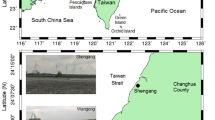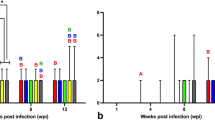Abstract
IN the years 1946 and 1947, epizootics have been observed among the manx shearwaters on the island of Skomer off the Pembrokeshire coast1. The birds affected have been juveniles nearly ready to leave the island. The disease is characterized by the occurrence of large blisters on the web, either plantar or dorsal surfaces. In 1946 severe conjunctivitis was also a notable feature, but was rare in 1947. Some birds show spasm of the legs shortly before death. It is estimated that at least 90 per cent of the birds with clinical signs die of the disease.
This is a preview of subscription content, access via your institution
Access options
Subscribe to this journal
Receive 51 print issues and online access
$199.00 per year
only $3.90 per issue
Buy this article
- Purchase on Springer Link
- Instant access to full article PDF
Prices may be subject to local taxes which are calculated during checkout
Similar content being viewed by others
References
Surrey-Dane, D. S., Ibis, 90, 340 (1948); J. Anim. Ecol. (in the press).
Author information
Authors and Affiliations
Rights and permissions
About this article
Cite this article
MILES, J., STOKER, M. Puffinosis, a Virus Epizootic of the Manx Shearwater (Puffinus p. puffinus). Nature 161, 1016–1017 (1948). https://doi.org/10.1038/1611016a0
Issue Date:
DOI: https://doi.org/10.1038/1611016a0
This article is cited by
-
Isolation of a coronavirus during studies on puffinosis, a disease of the Manx shearwater(Puffinus puffinus)
Archives of Virology (1982)
Comments
By submitting a comment you agree to abide by our Terms and Community Guidelines. If you find something abusive or that does not comply with our terms or guidelines please flag it as inappropriate.



